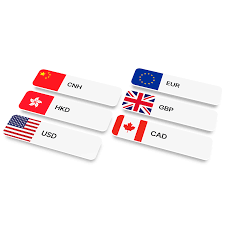Uncategorized
Multi Currency Wallets Impact on Global Crypto Adoption

The world of cryptocurrency has grown so rapidly, with new tokens, coins, and blockchain projects emerging almost daily. To keep up with this growth, users need digital wallets that can manage various assets securely and efficiently.
Gone are the days when users had to juggle multiple wallets for different cryptocurrencies. Today, these wallets provide a seamless way to manage a diverse crypto portfolio. This is where multi currency wallets like Jaxx Liberty Wallet come into play.
In this article, we’ll explore why multi-currency wallets are the future of crypto and discuss the ones that stand out.
Key Takeaways
- Multi-currency wallets enhance user experience by simplifying asset management.
- They contribute significantly to the global adoption of cryptocurrencies by reducing barriers.
- Future developments in wallet technology will likely drive further digital finance innovations.
Fundamentals of Multi-Currency Wallets
These wallets facilitate the management of various cryptocurrencies and digital assets in one location. Understanding their core principles, features, and types is essential for users seeking to engage in the crypto ecosystem more efficiently.
They are digital tools that allow users to store, send, receive, and exchange multiple cryptocurrencies and fiat currencies within a single interface.
These wallets offer convenience for individuals involved in varied financial activities. They can manage diverse assets like Bitcoin, Ethereum, and stablecoins, as well as traditional currencies such as USD or EUR.
Such wallets cater to a range of user needs, from personal investments to business transactions. Their ability to support different asset types promotes seamless interaction across various platforms and exchanges, making them indispensable for crypto enthusiasts and global traders alike.
Key Features and Functionalities
Key features of multi-currency wallets include:
- Security: Most wallets utilize encryption and multi-factor authentication to protect assets.
- User Interface: An intuitive design helps users navigate easily, even if they are new to cryptocurrencies.
- Asset Management: Users can view balances and transaction histories in real-time.
- Cross-Platform Compatibility: Many wallets function on various devices, including desktops, tablets, and smartphones.
Additionally, some wallets enable direct swaps between cryptocurrencies without needing to go through an exchange, thereby streamlining transactions. This functionality is critical for users who prioritize quick and efficient trading.
Facilitating Global Crypto Adoption
Multi-currency wallets play a crucial role in enhancing the adoption of cryptocurrency across the globe. They streamline transactions, improve user experiences, and foster inclusivity in the financial landscape.
Enhancing User Convenience
Multi-currency wallets allow users to store multiple cryptocurrencies in one secure location, simplifying asset management.
This convenience eliminates the need for numerous wallet applications and reduces the complexity associated with handling different currencies.
Users can easily swap between cryptocurrencies, making transactions more efficient. Moreover, these wallets often come with user-friendly interfaces, catering to both novice and experienced users.
The ability to manage various digital assets in one place streamlines trading and transaction processes. As a result, users are more likely to engage with cryptocurrencies if their experiences are seamless and intuitive.
Supporting Cross-Border Transactions
Cross-border transactions can be expensive and time-consuming through traditional banking systems.
Multi-currency wallets mitigate these challenges by facilitating near-instant transfers at lower costs.
These wallets enable users to transact with anyone in the world without worrying about currency conversion rates or hefty fees. This feature is particularly beneficial for individuals and businesses that operate internationally.
They make it easier for users to transact in various currencies, promoting a more interconnected financial system.
Promoting Inclusivity in Financial Services
Multi-currency wallets play a significant role in promoting financial inclusivity. They provide access to cryptocurrencies for individuals who lack traditional banking services.
By enabling users to hold and transfer digital assets, these wallets can help bridge the financial gap for unbanked populations.
This inclusivity fosters economic participation and empowers individuals to engage in the digital economy.
Furthermore, the use of multi-currency wallets supports local economies by allowing users to transact in their preferred currencies. This flexibility encourages diverse economic activities, benefiting communities worldwide.
Through these mechanisms, multi-currency wallets contribute significantly to the global adoption of cryptocurrencies, making them a vital tool in today’s financial landscape.
Challenges and Considerations
Multi-currency wallets present significant opportunities for global cryptocurrency adoption, yet they also come with challenges that must be addressed.
The security of assets, regulatory frameworks, and technical limitations all play critical roles in their effectiveness and acceptance.
Security Concerns
Security is a paramount issue for multi-currency wallets, as they aggregate numerous cryptocurrencies into a single platform.
Threats such as hacking, phishing, and malware can compromise user assets, leading to significant financial losses.
Many wallets employ advanced security features, such as multi-signature authentication and two-factor authentication (2FA), to enhance protection.
However, users must remain vigilant and adopt best practices, including using strong passwords and keeping software updated.
The potential for human error adds another layer of risk, as unintentional actions can expose private keys or sensitive information to malicious actors.
Regulatory Hurdles
The regulatory landscape for cryptocurrencies is complex and varies significantly across jurisdictions.
Many regions lack clear guidelines, which can deter businesses and investors from fully embracing multi-currency wallets.
Countries like the United States and the European Union have initiated frameworks, yet inconsistencies remain, complicating compliance.
Furthermore, regulations often evolve in response to market dynamics, leading to uncertainty. Wallet providers must navigate these changes carefully to avoid legal repercussions.
The Future of Multi-Currency Wallets
Innovations on the Horizon
Multi-currency wallets are likely to see a range of innovative features shortly. One key advancement is enhanced security measures, including multi-signature technology and biometric authentication, which may bolster user confidence.
Additionally, wallets may integrate advanced features such as staking options and liquidity pools, allowing users to earn passive income from their holdings.
The compatibility with decentralized finance (DeFi) applications will allow for more flexible asset management.
As these innovations emerge, they are expected to attract a broader audience to cryptocurrency.
Integration with Traditional Finance
The integration of multi-currency wallets with traditional financial systems is becoming increasingly apparent.
Partnerships with banks and payment platforms can enable smoother transactions, allowing users to exchange fiat and cryptocurrencies effortlessly.
This integration may also lead to the development of hybrid services, combining crypto functions with everyday banking services.
For instance, users could manage both their crypto assets and traditional financial products within the same platform. Such developments could enhance legitimacy and overall comfort with digital currencies in mainstream finance.
Global Impact and Potential Growth
The proliferation of multi-currency wallets has the potential to facilitate cryptocurrency adoption on a global scale.
By supporting a diverse range of currencies, these wallets can simplify cross-border transactions, making international commerce more accessible.
As travel becomes more common in the post-pandemic world, multi-currency wallets can appeal to frequent travellers seeking to minimize exchange fees and manage multiple currencies easily.
Countries with limited access to traditional banking could benefit significantly by adopting these digital solutions, enhancing financial inclusion.
The future looks promising as blockchain technology continues to evolve, supporting the rapid growth of multi-currency wallets in everyday financial transactions.




